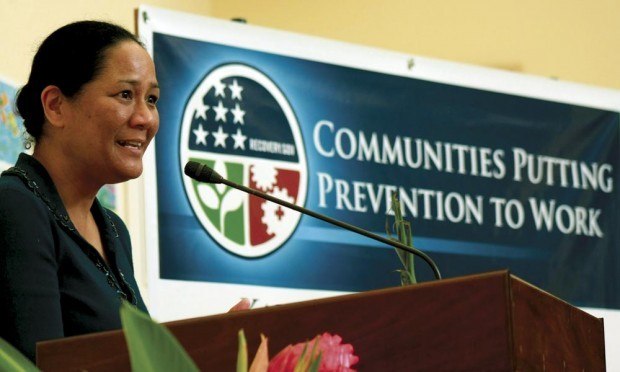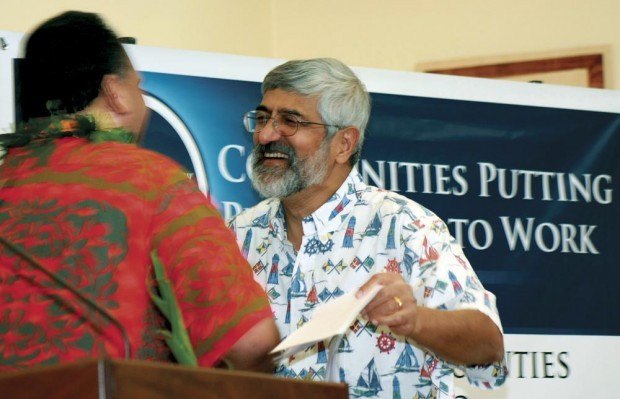LIHU‘E — U.S. Department of Health and Human Services Secretary Kathleen Sebelius announced from Washington, D.C., Friday that the Kaua‘i and Maui District Health Offices through the state Department of Health will launch the Communities Putting Prevention to Work initiative, according to press releases.
Kaua‘i and Maui, along with 42 other communities around the country, will collaborate in this nationwide effort to combat obesity through policy, systems and environmental changes.
These programs are part of the national campaign sponsored by the Centers for Disease Control and Prevention, the public health arm of the U.S. Department of Health and Human Services.
Improved nutrition and increased physical activity will be the core strategies in using the $3.4 million American Recovery and Reinvestment Act award for the Kaua‘i and Maui initiatives.
“We are very pleased that Kaua‘i has been selected as a benefiting community. The health of our residents is of great concern to this administration,” Kaua‘i Mayor Bernard Carvalho Jr. said in the county release. “I am committing the County to advance the CPPW national initiative on a local level, and to help assure the success of this ambitious project.”
Dr. Chiyome Leina‘ala Fukino, director of the state DOH, wanted Hawai‘i’s application to be submitted on behalf of the Neighbor Islands, to which end Fukino asked Dr. Dileep Bal, Kaua‘i district health officer, to be the principal investigator for this effort.
Bal, joined by Dr. Lorrin Pang, Maui district health officer, developed and submitted a joint application that engages key private, public, and non-profit sector community partners in both counties.
Fukino noted that she is very pleased with the success of Hawai‘i’s application, as only 10 percent of the 300 applicants in this very competitive procurement received funding.
Carvalho also complimented Bal and Pang on the success of their application in the face of such intense competition.
A leadership team chaired by state Rep. Hermina Morita will guide the project and Dr. Randall Blake of Kaua‘i will serve as vice chair.
Kaua‘i team members who composed the successful application under Bal’s guidance included: John Hunt, administrative officer, Kaua‘i District Health Office; Jodi Drisko, chair of the Get Fit Kaua‘i Steering Committee; Thomas Noyes, general coordinator for the Friends of Kamalani and Lydgate Park; Blake, vice president of Kaua‘i Path; and Bev Brody, Get Fit Kaua‘i island coordinator for the Nutrition and Physical Activity Coalition of Kaua‘i.
“Looking forward, over the coming weeks the team will be tailoring the local program objectives and tactics to the state’s $3.4 million budget, in accordance with the national goals,” said Bal. “Communities across the country will join in a concerted effort to most efficaciously assault our age’s most profound public health hazard. Our health is endangered by the prevalence of sedentary life styles exacerbated by poor dietary habits, with resulting increases in overweight and obesity among our citizenry.”
The Kaua‘i District Health Office is the lead agency on this grant and will be working with many community partners to prevent obesity through policy, systems and environmental changes that improve nutrition and increase physical activity.
Core program participants on Kaua‘i include William Arakaki, Complex Area Superintendent, Hawai‘i State Department of Education and Dr. Helen Cox, chancellor of Kaua‘i Community College.
Additional key partners on Kaua‘i include the County of Kaua‘i, Kaua‘i Path, Get Fit Kaua‘i — Nutrition and Physical Activity Coalition, and Malama Kaua‘i.
The Kaua‘i District Health Office will work with the existing Nutrition and Physical Activity Coalitions and additional partners using multiple inter-related Media, Access, Point of Purchase, Price, and Social Support Services strategies to accomplish the following objectives:
— Raise residents’ knowledge and awareness of healthy eating and active living through multiple media venues.
— Increase physical activity and improve nutrition for residents through social support, culturally appropriate education and behavior change.
— Create local infrastructure for production, distribution, and processing of locally grown agricultural products including links with schools, restaurants, and grocery stores.
— Increase access to and consumption of local produce.
— Restrict the availability of unhealthy foods in schools.
— Promote healthy foods in grocery stores.
— Improve active transport and public transportation infrastructure.
The principal investigator and lead fiduciary agent for this effort will be Bal, and any questions regarding this program may be directed to him at the Kaua‘i District Health Office at 241-3614.







